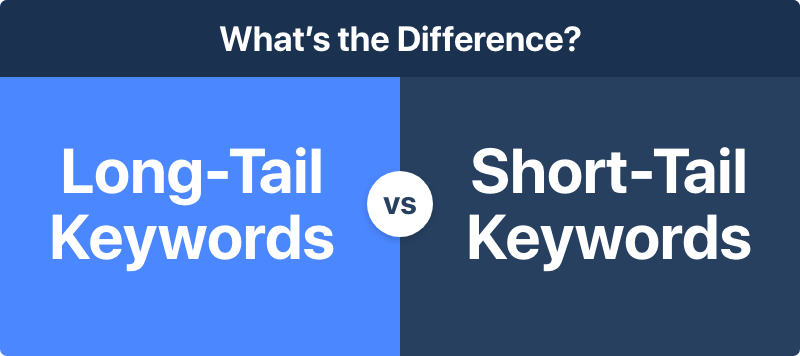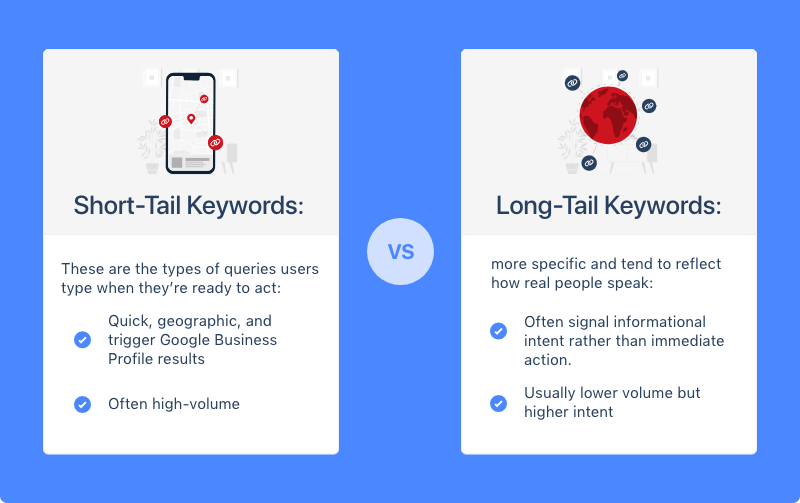If you've spent any time working on local SEO, you've probably heard the terms long-tail and short-tail keywords thrown around.
But in today's evolving local search ecosystem, shaped by AI assistants, voice search, and AI-driven search engine features like Google's AI Overviews, understanding the difference between long-tail vs short-tail keywords is more important than ever.
Whether you're a local business owner or an SEO pro, knowing how to strategically use both types of keywords can help you ensure the long-term effectiveness of your local SEO efforts.
Keep reading for insights into the difference between long-tail keywords vs short-tail, and how you should prioritize them for your local SEO strategy today.

Long-Tail vs Short-Tail Keywords: What's the Difference?
At the most basic level, the difference between short-tail vs long-tail keywords comes down to length and specificity.
Short-tail keywords are usually one to three words long. Think:
- "pizza delivery"
- "Toronto dentist"
- "yoga studio"
These are broad search terms that get a high volume of searches, but also come with heavy competition.
Long-tail keywords, on the other hand, are longer phrases, often entire sentences or questions. Examples include:
- "best deep dish pizza delivery in Toronto open late"
- "how often should I go to the dentist for a cleaning"
- "affordable beginner yoga classes near me with free parking"
These queries are more specific and tend to reflect how real people speak, especially when using voice search or AI tools like Claude, Gemini, or ChatGPT.
In short:
- Short-tail = broad, general, often high-volume
- Long-tail = specific, detailed, often lower volume but higher intent
Understanding long-tail vs short-tail keywords isn't just an academic exercise. It directly affects how you optimize your content and connect with customers in your local area.

Long-Tail Keywords vs Short-Tail Keywords for Local SEO: Which Is More Important?
Now that we've defined the two types of keywords, let's look at how each plays a role in local SEO.
Short-Tail Keywords in Local SEO
Traditionally, short-tail keywords have been the bread and butter of local SEO. These are the types of queries users type when they're ready to act:
- "coffee shop near me"
- "emergency plumber Chicago"
- "car detailing Vancouver"
In local SEO, short-tail keywords are quick, geographic, and trigger Google Business Profile (GBP) results, either in the local pack on Google Search or directly in Google Maps. That's why local SEO strategies have long focused on optimizing for these types of keywords.
Many types of short-tail queries signal immediate local intent. For example, someone searching for "nail salon downtown LA" is likely looking to book an appointment now. For this reason, your GBP optimization, especially categories and services, should still prioritize these core keywords.
Long-Tail Keywords in Local SEO
Historically, long-tail keywords haven't gotten nearly as much attention in local SEO. But that's changing fast.
The rise of voice search, AI assistants, and AI-powered search features like Google's AI Overviews and AI Mode, has dramatically changed how people perform local searches, especially on mobile devices.
For instance, instead of manually typing "plumber near me," into Google Search or Maps, users might now verbally ask an AI assistant:
"Who's the best plumber in Calgary for fixing frozen pipes in winter?"
Or:
"How much does it cost to unclog a kitchen sink drain?"
These longer, more conversational queries often signal informational intent rather than immediate action, but they can still lead users to your business.
For example, let's say someone asks, "how often should I get a dental cleaning?" and Google's AI Overview shows a summary that cites a local dentist's blog post as a source. That user might click through to read the post, learn they're long-overdue for a visit, and decide to call and book with that dentist, even though the original query wasn't commercial (purchase-oriented) in intent.
In this way, long-tail keywords can be a powerful tool for brand discovery, credibility, and top-of-funnel engagement, especially as AI-driven search features continue to evolve and surface local businesses across new interfaces.
How Should You Prioritize Optimizing for Long-Tail vs Short-Tail Keywords in Local SEO?
So, when it comes to local SEO, which should you focus on, long-tail or short-tail keywords? The answer is: both.
Your top priority should still be optimizing your Google Business Profile and main business site pages for the short-tail keywords that directly describe your business, products or services, and location. These are the keywords most likely to drive immediate leads and visibility in Google Maps and the local pack. But don't stop there.
As AI becomes more integrated into search behavior, optimizing for long-tail keywords is increasingly important, especially in your blog content, FAQs, and location or service landing pages.
Striking the right balance involves:
1. Short-Tail Keyword Optimization
- Add GBP categories and services that align with target short-tail keywords
- Include short-tail keywords in title tags, meta descriptions, headings, and content on core pages
- Use geo-modified short-tail keywords to match user searches with geographic intent
2. Long-Tail Keyword Optimization
- Use keyword research tools tools to find common questions and search phrases
- Create blog content, how-to guides, and FAQs that provide clear answers related to long-tail queries
- Write naturally and conversationally to align with AI search and voice search patterns
By covering both bases, you increase your chances of appearing in:
- Local pack results
- Organic results
- Google's AI Overviews
- Featured snippets
- Voice search responses
- AI assistant answers from tools like Claude or ChatGPT
Does Local Falcon Have a Local Keyword Research Tool?
Yes! You can now do all your local keyword research directly within Local Falcon, for free! The Local Keyword Tool helps you:
- Discover both short-tail and long-tail keywords that real people are searching for in your city or service area
- Uncover question-based queries that align with AI search and voice search patterns
- See search volume and competitive difficulty for local terms so you know where to focus your efforts
- Understand the potential value of a keyword using the WYN score
- Build content ideas for blogs, service pages, and FAQs that capture both immediate local intent and top-of-funnel interest
- Track performance and evaluate opportunities with a Quick Scan or Campaign Scan built around a highly targeted, hyperlocal keyword list for traditional or AI search
The Local Keyword Tool combined with Local Falcon's comprehensive local visibility tracking helps you go from research to results, making sure your business shows up across all the tools that your potential customers are using to find local solutions.

The Bottom Line
Understanding the difference between long-tail vs short-tail keywords is essential for any successful local SEO strategy in the AI era.
Short-tail keywords still influence the local pack and drive the most direct actions, but long-tail keywords are your gateway to greater visibility across emerging AI-driven search experiences.
Optimizing for both short and long-tail keywords helps ensure your business appears no matter where and how your potential customers search for products, services, and information online.
As you optimize for your target keywords, don't forget to track your rankings with Local Falcon to monitor the results. Track Google Business Profile rankings and performance metrics, Google AI Overview appearances, ChatGPT mentions, and more for granular insights into your overall local search performance!


